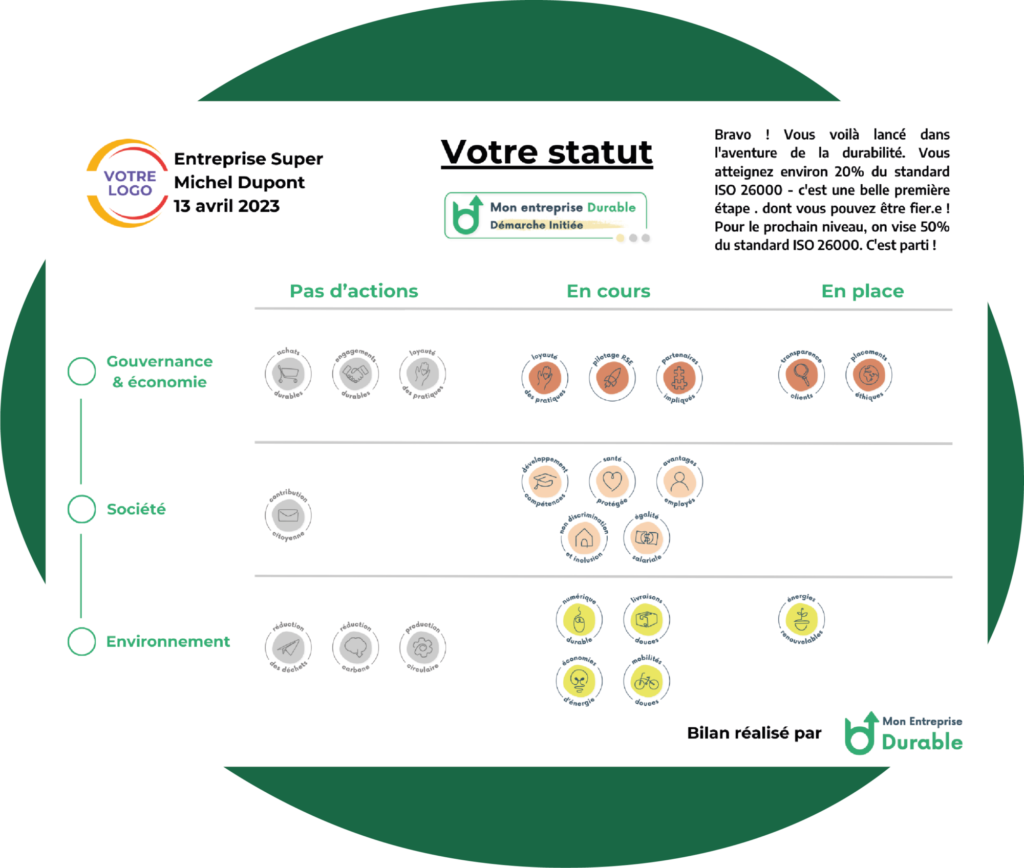How and why assess the impact of your business?
Now that your company has established a CSR policy, it’s time to measure its impact with a CSR assessment!
How have your actions affected the company’s activities?
What are the areas for improvement?
Is your CSR approach eligible for an award?
That’s what this article is all about!
Key points of the article
CSR and global performance: how to measure and assess them?
What is a CSR assessment?
A CSR assessment is an analysis of the way in which a company has integrated CSR principles into its operations.
The aim is to measure the consistency of actions with the principles established by a reference framework, such as ISO 26000, and to gain a precise idea of their impact.
The results of this assessment are invaluable, as they demonstrate the company’s CSR progress and give it both internal and external credibility.
Why conduct a CSR assessment?
In general, companies carry out CSR assessments to demonstrate their investment in sustainable development to their stakeholders.
CSR assessments also help to strengthen a company’s brand image.
What is the basis of a CSR assessment?
The global performance measurement and CSR assessment process is divided into several stages.
First, an in-house CSR team defines the company’s CSR strategy.
Next, the legal requirements are identified, and all kinds of documents and appendices relating to the company’s activities are examined.
This analysis will shed light on the degree of stakeholder involvement.
It is also possible to have this assessment carried out by an external party with CSR expertise, such as a certifier.
The assessment system may vary according to the context and the company, but generally includes the steps listed above.
The rating system is based on various elements, including :
- Proof of CSR commitment
- Taking into account the country, context and specific features of the company
- Different rating sources
- Corporate transparency
- The impact of its actions on the CSR pillars
Once again, there are several different methodologies.
CSR indicators
To complete the evaluation process as fully as possible, it is essential to set up a number of sustainable performance indicators.
These enable us to monitor our CSR policy and its effectiveness, as well as to identify areas for improvement.
There are a great many CSR indicators.
They can be characterized by figures, but also by distinctions.
These include labels and certifications that guarantee the quality of a company’s CSR initiatives.
They represent a reliable and valuable indicator on the market.
Carbon footprints and ESG (Environmental, Social and Governance) criteria are also basic indicators for assessing a company’s overall position in sustainable development issues.
These three tools form the basis of CSR indicators.
It is also possible to set up a system of KPIs that will accurately record performance and its impact on a day-to-day basis.
Finally, there are a multitude of CSR indicators to be implemented, based on the different pillars of CSR: Environmental, Social, Governance, Economic…
There are a number of environmental indicators designed to prove that a company is reducing its environmental impact:
- Greenhouse gas emissions and measures taken to reduce them
- The overall carbon footprint of the company’s activities and employees
- Recycled waste figures
- The amount of plastic emitted
- Measures to reduce waste
- Water and energy consumption figures
The governance indicators attest to an ethical and corruption-free company.
They guarantee a working environment that respects everyone’s rights:
- Transparency measures
- Management
- Resources and team dedicated to CSR
Social indicators illustrate beneficial working conditions for employees and equal opportunities for all.
They are also proof of employee satisfaction:
- Number of men and women
- Employee satisfaction index
- Seniority rate
Finally, the economic indicators are those that attest to customer loyalty and satisfaction with the company’s CSR policy.
They also indicate the company’s investment in sustainable development through its choice of partners and suppliers:
- Number of partners and suppliers recognized as responsible
- Responsible purchasing and sales
We hope we’ve answered your questions about CSR assessment!




